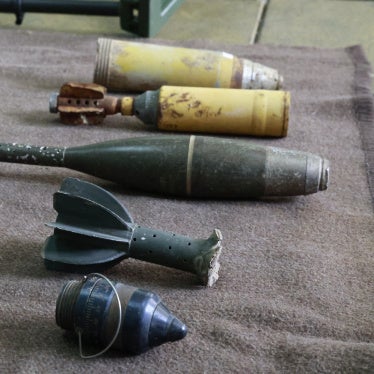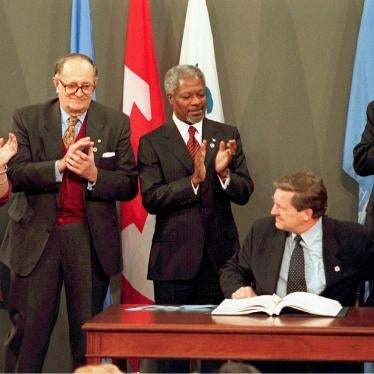Thank you Mr. Chair,
There are a disturbing number of compliance issues that States Parties should be addressing. Just as disturbing, States Parties have for the most part shown little desire to date to address these issues.
We have already in other sessions raised concerns about compliance in several areas. So we will only remind you of them now, but not elaborate on them.
First, we remain seriously concerned about ongoing non-compliance with stockpile destruction deadlines by three States Parties. Nearly four years after missing their deadlines, Greece is back in a holding pattern with no end date in sight, and Belarus has said it needs another year and a half. More than one year after missing its deadline, Ukraine is also in something of a holding pattern and has indicated it will take many years to complete destruction. Having so many States Parties remain in violation of the treaty for such a long period of time will naturally lead some—especially those still outside the treaty—to question the credibility and impact of the treaty.
Second, we believe that the time has come for States Parties to look at apparent abuses of the Article 3 exception for mines retained for training as a compliance issue, and not just a reporting issue. Too many States Parties are retaining mines without any indication that they are utilizing them for permitted purposes; the mines seem to simply sit in stocks.
Third, the Republic of Congo is in violation of the treaty for missing its clearance deadline earlier this month without requesting an extension. It has made a request this week which States Parties will decide on later today. We are concerned that for a number of other countries, lack of action on the clearance front may constitute a compliance problem and not only an implementation problem.
Leaving those issues, we would like to focus on allegations of use of antipersonnel mines.
There have been repeated reports and allegations this year of new mine use in Sudan by both government and rebel forces. Due to the security situation, Landmine Monitor has not been able to investigate the allegations. But based on concerns expressed by UN personnel, the allegations are serious and merit careful investigation and finding of facts. It appears certain that some type of mine use by some armed force or forces has taken place. But, there is a lack of clarity about whether antipersonnel mines or antivehicle mines, or both, have been used, and about what forces may have used the mines. We encourage Sudan to discuss this with other States Parties. This matter warrants urgent attention by States Parties, as it invokes the most egregious violation possible of the treaty.
In that vein, we would also like to return to the allegations of use of antipersonnel mines by one or more members of the Turkish Armed Forces in 2009. Turkey correctly launched an investigation and then pursued legal action, and has pledged to inform States Parties about the investigation when it is completed. But it seems to us more transparency is possible now, given the considerable amount of publicly available information, including official documents and transcripts, provided through extensive media coverage.
Earlier today Turkey, for the first time that we are aware of, acknowledged to States Parties that there are other allegations of use that do not directly relate to that trial, notably reports of the use by Turkish forces of M2A4 antipersonnel mines, the type that Turkey retains for training under Article 3. We were pleased to hear that an investigation has been or still is being conducted into this. We appreciated hearing a preliminary finding, and look forward to the full results. States Parties would no doubt welcome more details such as when the investigation began, if it has concluded, who conducted it, and what specifically was or is being investigated.
Allegations of use by States Parties are of course the most disturbing developments. But the ICBL and States Parties have repeatedly said that any use of antipersonnel mines by any actor should be condemned, as it runs counter to the norm being established by the Mine Ban Treaty. This is a broader, but proper, concept of compliance—abiding by the norm.
In this respect, it was appalling to see an increase in 2011 in the number of governments using antipersonnel mines. In recent years, only the armed forces of Myanmar have been confirmed to use antipersonnel mines. However, this year, in addition to Myanmar, the forces of Muammar Gaddafi used mines on several occasions during the conflict in Libya, and Israel laid new mines on its border with Syria. It also appears likely that Syrian forces laid antipersonnel mines on the border with Lebanon. Moreover, non-state armed groups used mines in at least four countries (Afghanistan, Colombia, Myanmar, and Pakistan), and possibly in Mali, Sudan, and South Sudan as well.
We urge all States Parties to do their duty and directly confront compliance issues. Please do not turn a blind eye. Non-compliance directly corresponds to a weakened humanitarian impact of the treaty. We implore you to stay true to your commitment to protect and promote the core humanitarian aims of the treaty.
Thank you.








